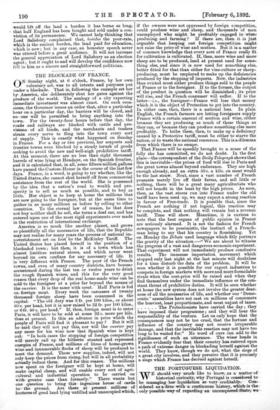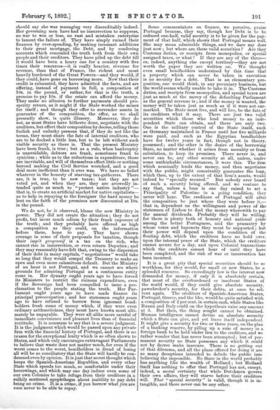THE PORTUGUESE LIQUIDATION.
AVE should very much• like to know-, as a matter of historical curiosity, why Portugal is considered to be managing her- liquidation so very creditably. Con- sidered as a firm with a continuous history, whichis the only possible way of regarding an unconquered:State, we should say she was managing very discreditably indeed. Her governing men have had no insurrection to suppress, no war to win or lose, no vast and mistaken enterprise to lament the failure of. They have simply ruined their finances by over-spending, by making incessant additions to their great mortgage, the Debt, and by rendering accounts which concealed the truth both from their own people and their creditors. They have piled up the debt till it would have been a heavy one for a country with five times their resources—it is really heavier, revenue for revenue, than that of France, the richest and most heavily burdened of the Great Powers—and they would, if they could, have gone on borrowing more. Now that their credit is exhausted, they have admitted the facts, and are offering, instead of payment in full, a composition of 10s. in the pound, or rather, for that is the truth, a promise to pay 10s. if the estate can afford the money. They make no allusion to further payments should pro- sperity return, as it might if the State worked the mines for itself ; and though they offer to surrender assets in guarantee of the composition, the offer, as we shall presently show, is quite illusory. Moreover, they do not, as most States have hitherto done, negotiate with the creditors, but effect their composition by decree, telling those foolish and unlucky persons that, if they do not like the terms, they must share the fate of internal creditors, who are to be docked a little less, but to be left without such visible security as there is. That the present Ministry have been frank, is true ; but as a rule, when bankruptcy is unavoidable, debtors are frank, sometimes frank to cynicism ; while as to the reductions in expenditure, those are inevitable, and will of themselves effect little or nothing beyond making the Civil Service wretched, and a good deal more inefficient than it ever was. We have no belief whatever in the honesty of starving tax-gatherers. There are, it is true, to be new taxes ; but they are not voted yet, and when they are, they are avowedly in- tended quite as much to " protect native industry "- that is, to create an artificial market for native capitalists— as to help in repaying to the foreigner the hard money he lent on the faith of the promises now discounted at 10s. in the pound.
We do not, be it observed, blame the new Ministry in power. They did not create the situation ; they do not profit, but incur much odium by their frank exposure of the truth ; and they probably have offered as high a composition as they could, on the information before them, hope to pay. They have shown courage in some of their proposals for taxation, though their impot progresirif is a tax on the rich, who cannot rise in insurrection, or even return Deputies ; and they may reasonably have felt that, owing to the dispersion of their debt in many capitals, " negotiations " would take so long that they would compel the Treasury to make an open and even more calamitous default. But the Ministry of an hour is not Portugal, and we cannot see where grounds for admiring Portugal as a continuous entity come in. Her dynasty ought years ago to have forced its Ministers to restrict the ruinous expenditure, even if the Sovereign had been compelled to issue a pro- clamation to the people stating the truth. Her Par- liament ought years ago to have made finance its principal preoccupation ; and her statesmen ought years ago to have refused to borrow from ignorant bond- holders fresh sums of money which, if they were even ordinary arithmeticians, they must have known must ulti- mately be unpayable. They were all alike more careful of immediate convenience and pleasant lives than of financial rectitude. It is nonsense to say that is a severe judgment.
It is the judgment which would be passed upon any private firm with the financial history of Portugal, and there is no reason for the exceptional lenity which is so often shown to States, and which only encourages extravagant Parliaments to believe that waste does not matter much, for even if the worst comes to the worst, bondholders in dread of losing all will be so conciliatory that the State will hardly be con- demned even by opinion. It is just that secret thought which keeps the Spanish-American Republics, and every other State which spends too much, so comfortable under their borrowings, and which may one day induce even some of our own Colonies to take refuge from their creditors in a sulkily muttered apophthegm about inability to pay. debt being no crime. It is a, crime, if you borrow what.you are sure never to be able to repay. Some commentators on finance, we perceive, praise Portugal because, they say, though her Debt is to be reduced one-half, valid security is to be given for the pay- ment of that half, which shows that Portugal means well, She may mean admirable things, and we dare say does just now ; but where are these valid securities ? Are they Customs duties, or receipts from monopolies, or special assigned taxes, or what ? If they are any of the three— or, indeed, anything else except territory—they are not worth the paper they are written on. We thought even small bondholders understood by this time that a property which can never be taken in execution is no security for a debt. That is an elementary pro- position, one would think, in any pecuniary business, but the world seems wholly unable to take it in. The Customs duties, and receipts from monopolies, and special taxes are just as much at the mercy of the defaulting Parliament as the general revenue is ' • and if the money is wanted, the money will be taken just as much as if it were not ear- marked. The State must live, and will live, be the fate of its creditors what it may. There are just two valid securities which those who lend money to an inde- pendent State can obtain, and there are only two. One is the military control of the State itself, such as Germany maintained in France until her five milliards were paid, and such as the Egyptian bondholders have for twelve years in fact, though not in theory, possessed ; and the other is the desire of the borrowing State, no matter whether it arises from morality- or from calculation, to keep its promises. There never is, and never can be, any other security at all, unless, under some unthinkable circumstances, it were this. The firm which nominally lends the money, and then negotiates with the public, might conceivably guarantee the loap, which then, up to the extent of that firm's assets, would indeed be "specially secured." But nobody ever heard of such a security being offered, and we venture to say that, unless a loan is one day raised to set a Principality of Palestine in a going condition, they never will hear. The creditors of Portugal will after the composition be just where they were before it,— that is, dependent on the willingness and power of the statesmen of Lisbon to find the money wherewith to pay the annual dividends. Probably they will be willing, for there is plenty both of honesty and national pride among the better Portuguese, and the peasantry -by whose votes and bayonets they must be supported ; but their power will depend upon the condition of the floating debt, which the creditors have no hold over, upon the internal peace of the State, which the creditors cannot secure for a day, and upon Colonial transactions which the creditors cannot hear of until they have been completed, and the risk of war or insurrection has been incurred.
It is a great pity that special securities should be so worthless, for they would, for small or new States, be a splendid resource. So exceedingly low is the interest now demanded for money, if only it is absolutely certain, that most of the overburdened or insolvent States of the world would, if they could give absolute security, pawnbroker's security, for their debts, at once be sol- vent again. The creditors of Spanish-American States, Portugal, Greece, and the like, would be quite satisfied with a composition of 2 per cent. in certain cash, while States like Russia and Italy could on the hypothesis raise any amount at 3. But then, the thing sought cannot be obtained. Human intelligence cannot devise an absolute security which a State can give, and yet leave itself independent. It might give a security for two or three years, on the plan of a banking reserve, by piling up a sum of money in a foreign bank to be held under lien to the creditors, and we rather wonder that has never been attempted; but of per- manent security no State possesses any which it could not by decree make insecure. There is no getting out of that dilemma, and all the plans offered for doing it are so many deceptions intended to delude the public into believing the impossible. No State in the world probably has anything like the wealth of Holland ' • but Holland itself has nothing to offer that Portugal has not, except, indeed, a moral certainty that while Dutchmen govern their own affairs, they will starve before their creditors will. That " special security " is valid, though it is in- tangible, and there never can be any other.







































 Previous page
Previous page